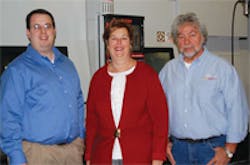Allied Specialty Precision Inc. Technology and people lead to twice the sales
Investing in technology and maintaining a high-quality workforce has helped Allied Specialty Precision, Inc. (ASPI) to double its sales in the past three years. The company prides itself on its workforce and technology.
ASPI specializes in producing precision hydraulic, fuel control and braking system components for the aerospace industry in materials such as aluminum, high-strength and highalloy steels, Inconel and titanium alloys. In addition to bar stock, they also machine castings and forgings. Pam Rubenstein, ASPI’s owner and chief executive officer, bought the 54-year-old company in 2005 and has realigned it to make it more cost driven and competitive.
ASPI holds ISO 9001:2000 and AS9100:01 certifications for aerospace quality and reliability. In addition, it is accredited under Nadcap standards AS7110 and AS7116, which are sponsored and maintained by The Society of Automotive Engineers (SAE) specifically for aircraft and aero-engines manufacturing.
ASPI is also a Certified Woman-Owned Small Business, making it quite special among contract manufacturers serving industry. Rubenstein takes this certification as seriously as all the others because it helps open doors for her company in both the corporate and government sectors. It is not a simple thing to achieve Woman Business Enterprise (WBE) certified status as Rubenstein and her core management group learned from full immersion three years ago. The process involves an extensive questionnaire about the financial control and, more important, the operational control of the enterprise. After reporting volumes of numbers, the certifying organization visits for one-on-one interviews with all levels of personnel to ensure that the owner is in full control of the day-to-day business, not just its shares. Financial control alone does not qualify for WBE status, and the certification must be confirmed annually.
|
Allied Specialty Precision began business as Allied Screw Products, Inc. to serve the Bendix Corp. Bendix became part of Honeywell Inc., and Honeywell is still among the company’s primary customers. The shop’s name was changed — it was re-branded about five years ago — to better reflect the work that it does now. No longer a screw machine shop, ASPI now runs 23 CNC machine tools, a number of manual machine tools and two coordinate measuring machines (CMMs) in a 26,000-sq-ft. facility. Looking toward the future, ASPI is striving to diversify both its customer base as well as the industries it serves.
Rubenstein said her shop is committed to keeping up with technology. It runs several Mazak CNC machines, including an Integrex 200 mill-turn with a gantry and two five-axis mills. It has a QTN 200 MSY lathe due on the floor later this year and an Integrex 100 mill-turn that is due to be installed in February.
In the last 3 years, the company has invested more than $2 million in new technology, including these machines. This new equipment is moving the shop further away from its screw machine roots and from its remaining manual machines to the “done-inone” technology Mazak advocates. “These new technologies require stronger engineering personnel and more highly trained operators.
The return is that this modern technology may allow us to eliminate some queue time and certain secondary operations,” Eric Kurzhal, president of ASPI, said.
“We work to everyday tolerances of 0.0002 in. The process is everything.” Larry DeLater, vice president, said. “It’s important to hold the part as few times as possible.
With the done-in-one concept, we can manufacture many parts that require multiple processes, including milling, drilling and tapping, on our Integrex or 5-axis mills in one setup. Multiple operations and fixtures introduce a lot of variability to the process, and these machines take that problem away. It’s very similar to when the first CNC machines were introduced. Once you have one, you can’t figure out how you operated without it. Only the creativity of the operators and programmers limit what you can do with the equipment available today.” In addition, DeLater said Mazak provides technology updates and training that fits with Allied Specialty Precision’s own training programs.
The shop has several levels of training programs, including handson training at the machines and continual software training. Engineers, programmers, operators and support staff are regularly sent to classes and user groups offered by Mazak, Unigraphics, ProfitKey International and other suppliers.
ASPI also has a Department of Labor-registered apprenticeship program. It had its first graduate in May and expects its second graduate to complete the program in December. The shop also regularly has summer interns. Last summer, it had 5 students from the Purdue School of Technology.
ASPI is one of the most vertically integrated job shops you will see. The only things it doesn't do are part coating and NDT. Its culture is very entrepreneurial. As Rubenstein said, “We want our customer’s problem parts.”
